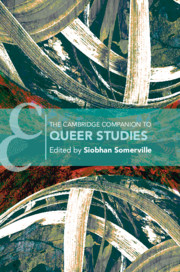Book contents
- The Cambridge Companion to Queer Studies
- The Cambridge Companion to Queer Studies
- Copyright page
- Dedication
- Contents
- Figures
- Contributors
- Acknowledgments
- Chronology
- Introduction
- Part I Genealogies
- Chapter 1 Genealogies of Queer Theory
- Chapter 2 Queer Writing, Queer Politics
- Part II Confluences
- Part III Representation
- Part IV Key Words
- Index
- Cambridge Companions to …
- References
Chapter 2 - Queer Writing, Queer Politics
Working across Difference
from Part I - Genealogies
Published online by Cambridge University Press: 02 June 2020
- The Cambridge Companion to Queer Studies
- The Cambridge Companion to Queer Studies
- Copyright page
- Dedication
- Contents
- Figures
- Contributors
- Acknowledgments
- Chronology
- Introduction
- Part I Genealogies
- Chapter 1 Genealogies of Queer Theory
- Chapter 2 Queer Writing, Queer Politics
- Part II Confluences
- Part III Representation
- Part IV Key Words
- Index
- Cambridge Companions to …
- References
Summary
Contemporary queer activism and scholarship builds on foundational work by women of color feminists, black feminists, and black gay artists. Anthologies and films, including This Bridge Called My Back edited by Gloria Anzaldúa and Cherríe Moraga, Sister Outsider by Audre Lorde, and Tongues Untied directed by Marlon Riggs, created languages and practices about difference and care that were central to organizing around AIDS. Working across difference, an organizing principle that pursues shared, liberatory goals without presuming a shared identity, requires creating coalitions within and across national borders that are attentive to the most vulnerable populations. Working across difference also depends on care work – the unglamorous, uncompensated practices of mutual aid, including nursing and mourning. Care work is the often invisible labor that sustained AIDS organizing, particularly as it was performed by grieving gays and lesbians, unable to participate in more visible public actions. As practices central to the emergence of queer politics and cultural production, working across difference and care work remains indispensable to imagining and pursuing freedom.
- Type
- Chapter
- Information
- The Cambridge Companion to Queer Studies , pp. 30 - 48Publisher: Cambridge University PressPrint publication year: 2020

